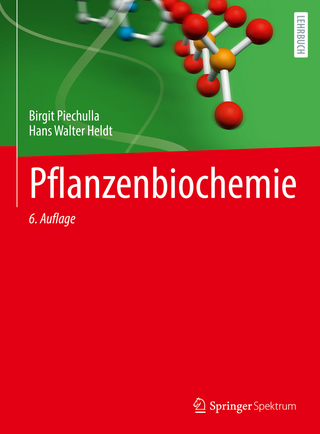
Polyamines- Phytohormones- Nutrients Network
Academic Press Inc (Verlag)
978-0-443-24734-7 (ISBN)
- Noch nicht erschienen (ca. Juni 2025)
- Versandkostenfrei innerhalb Deutschlands
- Auch auf Rechnung
- Verfügbarkeit in der Filiale vor Ort prüfen
- Artikel merken
Dr. Masood, Assistant Professor of Botany at Aligarh Muslim University, is presently working on stress physiology of plants and its regulation through internal factors including phytohormones and nutrients. His main area of research is to analyse the stress-induced responses in plants to heavy-metal accumulation and toxicity, mineral nutrient availability in the soil and also the role of phytohormones in regulating the nutrient status of cells and their synergistic effect in alleviating heavy-metal toxicity. His main findings have been reported in journals of repute, including Plant, Cell & Environment, Journal of Experimental Botany, Environmental and Experimental Botany, Photosynthetica, Plant Signalling and Behaviour, Journal of Plant Physiology and others. Prof. Nafees A. Khan research focuses on understanding the mechanisms of hormonal and nutritional regulation of plant growth with special emphasis on abiotic stress vis-a-vis photosynthetic efficiency and abiotic stress tolerance. He has received multiple recognitions of his work including recognition as a top scientist in a study conducted by Stanford University and published in Plos Journal He is highly cited and received a UGC Mid-Career Award in 2018. Dr. Naser A. Anjum, Assistant Professor of Botany at Aligarh Muslim University, has made significant contributions to the biology of ‘Plant/Crop-Environment Adaptation’. His works have enlightened the physiology and biochemistry of plants/crops, and their adaptation/tolerance to varied abiotic stress factors and pollutants. He has been the pioneer worker to unveil: nano-graphene mediated oxidative stress, antioxidant metabolism and glutathione-redox system, and also glutathione-independent defense-system significance in food crop model. He has also contributed to the field of phytoremediation, and assessed plant/salt marsh macrophyte chemical pollutantsremediation potential and the underlying physiological/(bio)chemical mechanisms. Dr. Anjum received prestigious research awards from Portuguese Foundation for Science and Technology (FCT) (Portugal), Academia Sinica (Taiwan), and the CSIR and DBT, Govt. of India. He is on the Editorial boards of several journals. He is serving as the Managing Editor of Plant Growth Regulation; and Associate Editor of International Journal of Plant Biology, Frontiers in Agronomy, and Frontiers in Marine Science. Dr. Vasileios Fotopoulos is Associate Professor in Structural and Functional Plant Biology and head of the CUT Plant Stress Physiology Group at Cyprus University of Technology. His main scientific research focuses on the study of nitro-oxidative signaling cascades involved in the plant’s response to stress factors, with special emphasis on the development of chemical, biological and nanotechnological priming technologies ameliorating abiotic stress factors and promoting plant growth. In addition, he is studying plant secondary metabolism and antioxidant responses in fruit crops during ripening.
1. Abiotic Environmental Stress Responses of Plants
2. Phytohormones and Nutrients Crosstalk-Outcomes in Mitigation of Abiotic Stress-Impacts in Plants
3. Potential Mitigation of Abiotic Stress Impacts under Microclimate in Plants Involving Polyamines and Microbes
4. Role of GABA in Abiotic Stress Tolerance in Plants
5. Abiotic Stress Resilience Approaches in Plants
6. Bridging the Link Between Nitrogen, Polyamines and Nitric Oxide for Heat-Stress Tolerance
7. Crosstalk on Phytohormones and Polyamines and Its Implications in Plants under Abiotic Stresses
8. Unravelling the Polyamine Metabolic Switch and Delineating the Roles of PAs in Plant Stress Tolerance
9. Polaymines in Agriculture under Climate Change
10. Methyl Jasmonate: Hormonal Crosstalk and Plant Nutrients Communications under Abiotic Stress Conditions
11. Systems Biology Approach and Enhanced Plant Abiotic Stress Tolerance
12. Macroelement in Plants Abiotic Stress Tolerance
13. Plant Hormones and Plants’ Abiotic-Stress Tolerance
14. Approaches for Engineering Abiotic Stress Tolerance in Brassica
15. Insights into Microelements in Plants’ Acclimation to Stress
| Erscheint lt. Verlag | 1.6.2025 |
|---|---|
| Reihe/Serie | Plant Biology, sustainability and climate change |
| Verlagsort | San Diego |
| Sprache | englisch |
| Maße | 191 x 235 mm |
| Themenwelt | Naturwissenschaften ► Biologie ► Biochemie |
| Naturwissenschaften ► Biologie ► Botanik | |
| ISBN-10 | 0-443-24734-X / 044324734X |
| ISBN-13 | 978-0-443-24734-7 / 9780443247347 |
| Zustand | Neuware |
| Haben Sie eine Frage zum Produkt? |
aus dem Bereich


